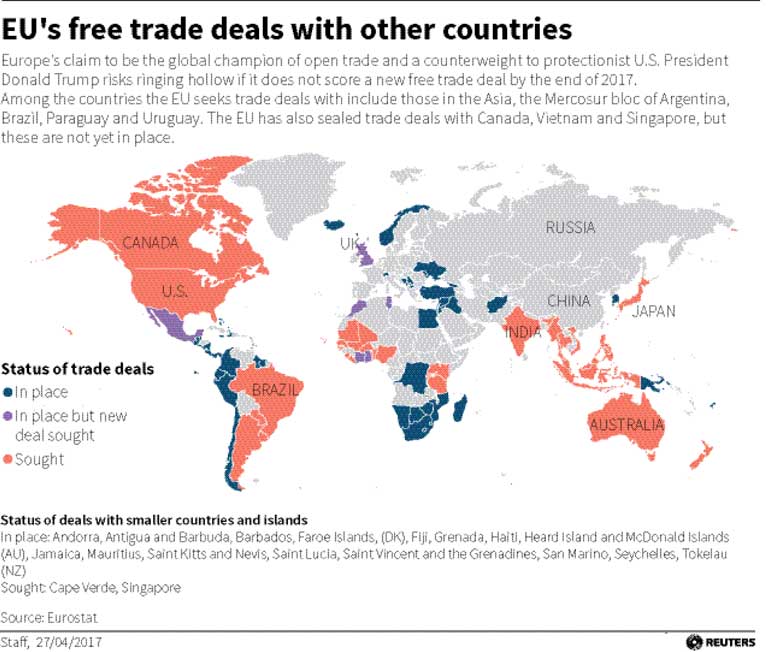Tuesday Feb 24, 2026
Tuesday Feb 24, 2026
Friday, 19 May 2017 00:00 - - {{hitsCtrl.values.hits}}

BRUSSELS (Reuters): Britain may have to wait – and hope – for every single one of its European Union neighbours to give full legislative consent before it can fully benefit from any post-Brexit free trade deal, EU judges ruled on Tuesday.
In a verdict that may also delay and potentially obstruct a string of other EU trade pacts, the European Court of Justice (ECJ) said an agreement struck with Singapore in 2014 cannot take full effect until ratified by 33 national and regional parliaments across the 28-nation bloc.
The European Commission, which runs trade policy for the EU, had hoped Brussels - where national governments also have a say - might be free to implement deals without having to consult assemblies, such as that of Wallonia in Belgium that nearly wrecked an accord with Canada last year.
The EU’s last major trade deal to enter force, with South Korea, took five years to be ratified.
The Commission, which sought the ruling, said it clarified divisions between EU and national powers.
A British government spokeswoman, asked for comment, said only that Britain hoped the Singapore deal would now be implemented.
London wants a trade agreement to keep much of its current access to Europe’s single market once it quits the EU in March 2019. But Brussels negotiators have warned such deals can take a decade or more from start to finish.
Any trade pact with Britain would need to be signed off in Brussels by all 27 EU governments after Brexit, but the ECJ ruling implies that, depending on the deal, national parliaments would also get a veto. So would federal Belgium’s five regional assemblies, among them Wallonia and German-speaking East Belgium (population 77,000).
“If the UK wants to sign a swift trade deal with the EU, it may have to get every one of the EU’s national governments to agree if the deal falls within their powers. This is no easy task,” said Laurens Ankersmit, trade lawyer at environmental activists ClientEarth.
Nicole Kar, head of international trade at law firm Linklaters, described the ECJ case as the most significant on EU trade policy for 20 years and said it would have “huge ramifications” for a future UK-EU deal.
Britain, she said, would need to decide if it wanted a more modest agreement likely to be backed or the most comprehensive deal possible that risked falling hostage to member states.
The ECJ said large parts of the Singapore deal fell within the centralised powers of the Union. However, a key element that went beyond was its creation of a judicial mechanism to settle disputes between businesses and governments.
The court said that, by removing disputes from the jurisdiction of domestic courts, this required national consent.Such supranational legal powers have been at the heart of opposition in Europe to recent free trade deals, including the last-ditch move by Wallonia’s left-wing leaders to halt the EU’s CETA pact with Canada last year. EU officials want to ease concerns that such powers favour big multinationals by ensuring future deals more clearly protect states’ rights to regulate.
British Prime Minister Theresa May has also made rejecting EU regulation and non-British courts, like the ECJ in Luxembourg, priorities for Brexit.
That means negotiations on a UK-EU trade deal could be fraught when it comes to agreeing who supervises and regulates business.
The Singapore treaty was among the first EU agreements to go beyond mutual reduction of customs duties on goods to include investments, public procurement and environmental regulation, and is seen by many as a model of future global trade deals.
Brussels hopes to seal trade agreements soon with Japan, Mexico and the Mercosur quartet of Argentina, Brazil, Paraguay and Uruguay. It was in negotiations with the United States on a pact known as TTIP, though those talks are on hold since Donald Trump became president this year.
AFP: Any trade deal linking the EU and Britain after Brexit will require guarantees against “unfair competition” by the UK, EU Council President Donald Tusk said on Wednesday.
With tensions high as next month’s Brexit talks approach, Britain has said it will fight back if the EU will not strike an acceptable exit deal.
This has sparked fears in Brussels that London would attempt to undercut EU regulations after the divorce on a range of issues if talks turn sour.
“The UK must be aware that any free trade agreement will have to ensure a level playing field and encompass safeguards against unfair competitive advantages,” Tusk told MEPs at the European Parliament in Strasbourg, France.
This guarantee would involve a wide range of matters, including “tax, social, environmental and regulatory measures and practices,” Tusk said.
Negotiations on a trade deal are not expected until talks on the fate of the millions EU citizens and Britain’s exit bill have made “sufficient progress”.
Tusk hailed the EU’s remaining 27 members who “have been united, consistent and have demonstrated solidarity with one another since the Brexit referendum last June.”
The Brexit negotiation “is now in the hands of our capable divorce lawyers,” said European Commission head Jean-Claude Juncker, who also addressed MEPs, in reference to the EU’s chief negotiator Michel Barnier.
“I want to wish him luck as I know he will leave nothing to chance,” Juncker said.